The fine folks at Headline Bistro have kindly published my latest article! Check it out, along with the rest of their excellent site, here!


The fine folks at Headline Bistro have kindly published my latest article! Check it out, along with the rest of their excellent site, here!

Kris Dmytrenko highlighted The New Mass App on today’s edition of “Perspectives” on Salt and Light TV. Here’s the clip – after talking about a different app for the Tridentine Mass, the mention of The New Mass App begins at the 4:05 mark:
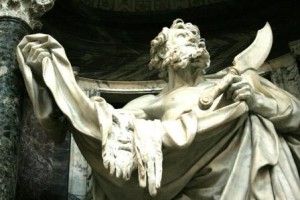 Today is the feast day of St Bartholomew, whom scholars commonly view as being none other than the apostle Nathaniel. Tradition states that following the Ascension, Bartholomew/Nathaniel preached the Gospel in India, and was eventually martyred, being skinned alive. That’s why the saint is portrayed in art as holding his own skin.
Today is the feast day of St Bartholomew, whom scholars commonly view as being none other than the apostle Nathaniel. Tradition states that following the Ascension, Bartholomew/Nathaniel preached the Gospel in India, and was eventually martyred, being skinned alive. That’s why the saint is portrayed in art as holding his own skin.
Here’s John’s account of Nathaniel’s meeting with Jesus:
Philip found Nathanael and told him,
“We have found the one about whom Moses wrote in the law,
and also the prophets, Jesus son of Joseph, from Nazareth.”
But Nathanael said to him,
“Can anything good come from Nazareth?”
Philip said to him, “Come and see.”
Jesus saw Nathanael coming toward him and said of him,
“Here is a true child of Israel.
There is no duplicity in him.”
Nathanael said to him, “How do you know me?”
Jesus answered and said to him,
“Before Philip called you, I saw you under the fig tree.”
Nathanael answered him,
“Rabbi, you are the Son of God; you are the King of Israel.”
Jesus answered and said to him,
“Do you believe
because I told you that I saw you under the fig tree?
You will see greater things than this.”
And he said to him, “Amen, amen, I say to you,
you will see heaven opened and the angels of God
ascending and descending on the Son of Man” (John 1:45-51).
“There is no duplicity in him.” Would that Jesus could say that of all of us.
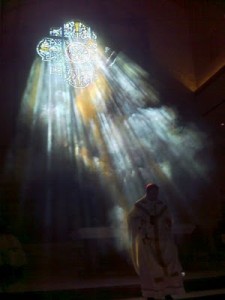 The famous “Church Whisperer”, Rocco Palmo, has verified that the United States Conference of Catholic Bishops (USCCB) have finalized their launch date for the new Mass. The new English translation will be effective in America on the first Sunday of Advent, 2011, just over one year from now. That isn’t much time for the massive educational task that lies ahead, as one high-ranking churchman makes clear in the post:
The famous “Church Whisperer”, Rocco Palmo, has verified that the United States Conference of Catholic Bishops (USCCB) have finalized their launch date for the new Mass. The new English translation will be effective in America on the first Sunday of Advent, 2011, just over one year from now. That isn’t much time for the massive educational task that lies ahead, as one high-ranking churchman makes clear in the post:
Msgr. Anthony Sherman, Director of the Secretariat for Divine Worship of the USCCB noted, “A great effort to produce the new Roman Missal for the United States, along with the other necessary resources, has begun. Even as that work is underway a full–scale catechesis about the Liturgy and the new Roman Missal should be taking place in parishes, so that when the time comes, everyone will be ready.”
I hope that The New Mass App can be of service in that task.
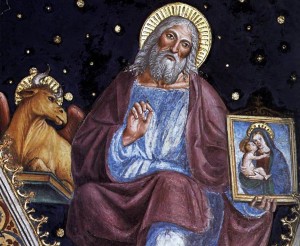 It is fashionable among New Testament scholars to date the composition of the Gospels in this way: Mark circa 70 AD, Matthew sometime later in the 70s, Luke in the 80s, and John approx. 90 AD (with Jesus’ Resurrection circa 33 AD). Even if they were written this late, they are still the equivalent of CNN news flashes in the ancient world. And, of course, a later date of composition does not necessarily equate to a historically inaccurate account. Even at these later dates, eyewitnesses of the life of Christ would still be alive and available to correct erroneous accounts. Having said this, the earlier the Gospels were written, the better the argument for their historicity in the eyes of many. And there is a very good argument that the Gospels were actually written much earlier.
It is fashionable among New Testament scholars to date the composition of the Gospels in this way: Mark circa 70 AD, Matthew sometime later in the 70s, Luke in the 80s, and John approx. 90 AD (with Jesus’ Resurrection circa 33 AD). Even if they were written this late, they are still the equivalent of CNN news flashes in the ancient world. And, of course, a later date of composition does not necessarily equate to a historically inaccurate account. Even at these later dates, eyewitnesses of the life of Christ would still be alive and available to correct erroneous accounts. Having said this, the earlier the Gospels were written, the better the argument for their historicity in the eyes of many. And there is a very good argument that the Gospels were actually written much earlier.
A key to the dating of the Gospels is actually the date of composition of the Acts of the Apostles, because Acts is the second of a two-part work by Luke the evangelist. The Evangelical scholar J.P. Moreland, in his classic apologetic work, Scaling the Secular City, enumerates many arguments for dating Acts between AD 62 and 64, only two of which I’ll mention here. Acts, like every other New Testament book, does not mention the destruction of Jerusalem and its temple in 70 AD (This is, of course, good evidence that all the NT books were completed by this date). It’s hard to believe that Luke’s works in particular, whose Gospel and Acts is so heavily focused on the Holy City, would fail to mention this fact. Second, no mention is made of the fierce persecution of the Church under the crazed emperor Nero, and the resulting martyrdoms of the two central figures in Acts, Peter and Paul, circa AD 64. The martyrdom of James, bishop of Jerusalem in 61 is also omitted. All of this is strange, considering the detail given by Luke to the account of the martyrdom of Stephen the deacon, and that of James, brother of John, another prominent figure in the early Church. Strange, that is, unless Luke wrote Acts prior to 64.
Back to the Gospels: If Luke wrote Acts before 64, that means Luke’s Gospel was written before that. And, since Luke used Matthew and Mark (the first Gospel to be written) as sources, they must be dated even earlier, perhaps as early as the mid-40s to the mid-50s, according to Moreland. Thus, we have biographies of Jesus that are perhaps 12 to 29 years removed from the events of his life – and they are based on sources (e.g. eyewitness accounts and early creeds) even earlier than that.
![]() Q. I’m going to try once more to show that St Paul says that we don’t really need to obey the Ten Commandments. In Galatians he writes, “Brothers and sisters: We know that a person is not justified by works of the law but through faith in Jesus Christ; even we have believed in Christ Jesus that we may be justified by faith in Christ and not by works of the law, because by works of the law no one will be justified” (Gal 2). See! Paul agrees with me! All we need is faith in Jesus Christ! We don’t need “the works of the law”.
Q. I’m going to try once more to show that St Paul says that we don’t really need to obey the Ten Commandments. In Galatians he writes, “Brothers and sisters: We know that a person is not justified by works of the law but through faith in Jesus Christ; even we have believed in Christ Jesus that we may be justified by faith in Christ and not by works of the law, because by works of the law no one will be justified” (Gal 2). See! Paul agrees with me! All we need is faith in Jesus Christ! We don’t need “the works of the law”.
A. Nice try, but it won’t work. When Paul says that we are not justified (made right with God) through “the works of the law”, he’s not talking about the Ten Commandments. He simply can’t be. Why? Consider the words of Jesus himself, in the famous Sermon on the Mount: “Do not think that I have come to abolish the Law or the Prophets; I have not come to abolish them but to fulfill them. I tell you the truth, until heaven and earth disappear, not the smallest letter, not the least stroke of a pen, will by any means disappear from the Law until everything is accomplished. Anyone who breaks one of the least of these commandments and teaches others to do the same will be called least in the kingdom of heaven, but whoever practices and teaches these commands will be called great in the kingdom of heaven” (Matt 5).
Q. I don’t understand. Jesus upholds the commandments, but Paul says we don’t need “the works of the law”. Who’s right?
A. They’re both right, of course! That’s because Paul is not talking about the Ten Commandments at all when he says that we don’t need the “works of the law”. Paul’s talking about something else: the ceremonial works of the Old Covenant. These were hundreds of rules that were tacked on to the Decalogue, which God dispensed with in the New Covenant . The two biggest examples are circumcision and the dietary (kosher) food laws of the Old Covenant. We don’t need to practice these as Gentile believers in order to please God (see Acts 15), but we do have to uphold the Ten Commandments. This is impossible in our own strength, by dint of our own will. As Jesus said, “With man this is impossible, but not with God; all things are possible with God” (Mk 10:27). It is only by the grace of Jesus Christ that we can – and must – keep the Ten Commandments as Catholics.
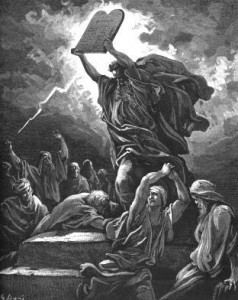 Q. What’s the other problem with my original question? Do you have an issue with my quoting of St Paul? He did say, after all, “you are not under law, but under grace” (Romans 6). That is sacred scripture, after all! To me, it clearly says that the 10 Commandments aren’t necessarily obligatory for Catholics.
Q. What’s the other problem with my original question? Do you have an issue with my quoting of St Paul? He did say, after all, “you are not under law, but under grace” (Romans 6). That is sacred scripture, after all! To me, it clearly says that the 10 Commandments aren’t necessarily obligatory for Catholics.
A. You’re taking Saint Paul’s statement out of context. I can make the Bible say anything I want it to, by plucking an individual verse out of its’ surrounding context – and context in many ways determines meaning. There’s an old saying among preachers – “A verse taken out of context becomes a pretext for a proof-text”. That’s just not good hermeneutics (biblical interpretation). If you actually go back and read the whole of Romans 6, you’ll find that Paul is emphatically NOT saying that because we live in New Covenant times that we don’t need to care if we sin or not. He writes, “Are we to continue in sin so that grace may abound? By no means! How can we who died to sin still live in it? Do you not know that all of us who have been baptized into Christ Jesus were baptized into his death? We were buried therefore with him in baptism into death, so that as Christ was raised from the dead by the glory of the Father, we too might walk in newness of life” (Romans 6:1-4). We died to sin through our baptism, which was like our “wedding’ to the divine bridegroom, Christ. To continue intentionally in a lifestyle of sin after baptism would be tantamount to committing adultery on one’s honeymoon.
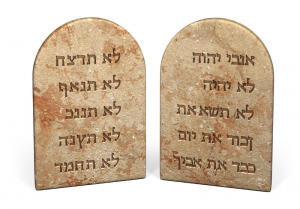 Q. Do we, as Catholics, still have to obey the Ten Commandments? After all, we’re not living in the Old Covenant age, but under the New Covenant of Jesus Christ. Even Saint Paul says, “you are not under law, but under grace” (Romans 6:14). And we know that Jesus will forgive us, even if we happen to break the commandments, right?
Q. Do we, as Catholics, still have to obey the Ten Commandments? After all, we’re not living in the Old Covenant age, but under the New Covenant of Jesus Christ. Even Saint Paul says, “you are not under law, but under grace” (Romans 6:14). And we know that Jesus will forgive us, even if we happen to break the commandments, right?
A. Whoa…hold on just a minute! You’ve made two assumptions in your question that are unwarranted. First, let me address your last point. Of course, it is possible for Jesus to forgive us – provided we repent. We must have true sorrow for our sins and a firm purpose of amendment to avoid sin in the future. It doesn’t mean that we have to live impeccable (i.e. sinless) lives from now on – our struggle against sin will continue for as long as we live.
I’d also like to rephrase something else you said. No one actually “breaks” any of God’s commandments – whether it be the Decalogue or any other divine command. You can’t break them – you can only break yourself against them. No one ever “gets away” with breaking God’s commandments. God created us and knows the best way for us to live. It’s like the owners manual for a car – you can “break” the owner’s manual by pouring beer in the gas tank – but the car won’t run like it should. In fact, it may even wind up irreparably damaged, depending on the severity of the action. One could be forgiven, of course, for doing such a thing, but the car in many ways will never be the same. And that danger exists for us, too, if we break the commandments of God.
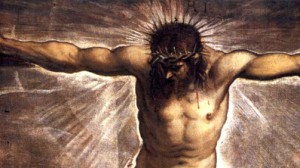 This Saturday I attended Mass at a different parish, where a priest I didn’t know made an arresting illustration in his homily.
This Saturday I attended Mass at a different parish, where a priest I didn’t know made an arresting illustration in his homily.
He spoke about Archbishop Oscar Romero, who did much to champion the cause of the poor in El Salvador before being assassinated in 1980. Romero was shot while he was elevating the chalice, full of the blood of Christ. Romero’s own blood mingled with the blood of the Savior as he lay dying.
Our lives, too, must be given up in a self-sacrificial union with Christ. His life, his blood, truly mingles with ours as we receive him in the Eucharist. We maintain union with Christ through the other Sacraments, our life of prayer, and our good works. This union must become stronger each day so that eventually, we will fail to see where Christ’s life begins and ours ends. We, and more importantly, others, will find Jesus is living his life through us.
This is exactly what it means to be Christians, “other Christs”.
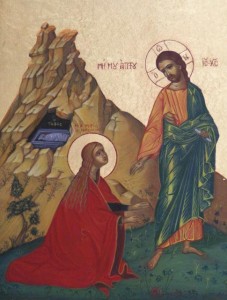 This is the feast day of St Mary Magdalene, dubbed “Apostle to the Apostles” because of her witness to the doubting (at the time) disciples of the Resurrection of Jesus. Today’s Gospel reading from John 20 reminds us of the initial encounter the Magdalene had with the risen Lord. This very account (along with the other Gospel accounts of women discovering the empty tomb) is a huge point in favor of the historicity of the Resurrection – without which, as St Paul reminds us in 1 Corinthians 15 – “our preaching is useless, and so is your faith”. The simple reason is that a woman’s testimony was considered unreliable – and hence, inadmissible – in a Jewish court of law in Jesus’ day (thankfully, things have changed).
This is the feast day of St Mary Magdalene, dubbed “Apostle to the Apostles” because of her witness to the doubting (at the time) disciples of the Resurrection of Jesus. Today’s Gospel reading from John 20 reminds us of the initial encounter the Magdalene had with the risen Lord. This very account (along with the other Gospel accounts of women discovering the empty tomb) is a huge point in favor of the historicity of the Resurrection – without which, as St Paul reminds us in 1 Corinthians 15 – “our preaching is useless, and so is your faith”. The simple reason is that a woman’s testimony was considered unreliable – and hence, inadmissible – in a Jewish court of law in Jesus’ day (thankfully, things have changed).
Put it this way: if you’re authoring a Gospel, and your’re trying to convince Jews (and Gentiles) that Jesus is the Messiah, you would never write that women were the first to discover the empty tomb and encounter the resurrected Jesus.
Unless, that is, it actually happened that way.
